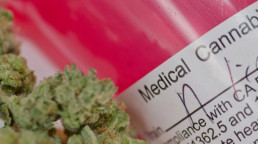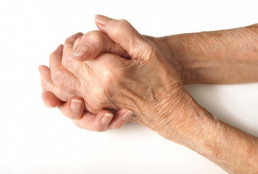9-year-old girl seizure free after using cannabis oil for one day
9-year-old girl seizure free after using cannabis oil for one day
A 9 year old girl has had her first seizure free day in years after using cannabis oil…for just 24 hours.
Amelia Weaver of Hibbing, Minnesota has Dravet Syndrome, a rare form of epilepsy that has been frequently covered in cannabis news after various reports of successful treatments.
Weaver would normally have between 30 and 80 seizures a day and her parents were looking for alternative medicine after no improvement in the young girls condition.
On Thursday 23rd July, Amelia’s parents picked up their first 20 day supply of cannabis oil, with the 9 year old given her first dose on Friday morning.
Incredibly, Amelia had no seizures on Friday or Saturday. As of Monday afternoon, she has had just 2 seizures.
Speaking to the media, Amelia amazed mother said,
“We gave her her first dose on Friday morning and she had a seizure-free day. We know and we understand that Amelia has a very serious medical condition, but all the advocating and all the fighting and all the work was worth it for just one drop-free day.”
“You can look at her now, and she’s focusing for the first time since she started having seizures. She’s looking at you in the eye. … Her body has calmed down. She’s starting to smile. It’s amazing.”
Israel to Sell Medical Cannabis in Pharmacies
Israel to Sell Medical Cannabis in Pharmacies
As the world leader in medical cannabis research and development, Israel have taken another positive step by introducing the sale of medical cannabis in pharmacies.
Deputy Health Minister Yaakov Litzman announced the move and stated that the decision is intended to relieve pressure on the limited dispensaries around the country, especially as more than 21,000 people are prescribed medical cannabis in Israel.
Speaking to the Israeli press, Litzman said, “(MMJ) will be prescribed and monitored by the same standards as other medications,”.
In other news from Israel, the Health Ministry is attempting to double the number of medical cannabis cultivators in the country from 8 to 16, in order to meet the overwhelming demand for the plant.
Army Officer Escapes Punishment After Using Cannabis to Help Dying Wife
Army Officer Escapes Punishment After Using Cannabis to Help Dying Wife
Damian Flood, 39, has avoided criminal punishment after admitting that he used cannabis to help ease his wife’s dying moments.
The Army veteran who served for nearly 2 decades in the Irish Defence Forces was found with nearly €10,ooo worth of cannabis at his home near Dublin. Initially,
Flood told the court that he was using the drugs to pay off his debts, which totalled nearly €40,000. However, he later revealed that he used the plant to help ease the passing of his wife, who was terminally ill with breast cancer.
Flood used online research to determine that juicing cannabis could help relieve his wife’s endless pain. The veteran stated that the cannabis worked for his spouse and she died peacefully, five months after his arrest.
After testimonials handed to the court indicated that Flood was a man of good character with an exemplary professional record, Jude Mary Ellen Ring stated that the explanation that he wanted to use the cannabis as pain relief was enough to avoid any conviction.
The decision made by the Irish courts is unique in circumstance and signals a possible change in thinking with regards to cannabis as medicine in Ireland.
How to Manage a Terminal Crohn's Diagnosis, by Sarah Godfrey
How to Manage a Terminal Crohn’s Diagnosis, by Sarah Godfrey
Sarah Godfrey is the only terminal Crohn’s patient known to have survived without having any part of her digestive system removed. Sarah used cannabis, herbal medicine and diet to save her life and also to end a 20-year dependency on Codeine, and 14 years on Valium and Morphine. She is currently healing her Crohn’s and CPTSD with cannabis oil and is a trustee of Hemp Works Charity UK.
Sarah’s Seasonal Cannabis, Dietary & Herbal Blog
This is my first blog for www.medicalmarijuana.co.uk, and I’m looking forward to sharing with you the holistic healing that has kept me alive for the last 22 years, when I was told that I had less than 6 months to live.
So my blog will be a seasonal sharing of what I’ve found worked best for myself and others, with cannabis, dietary and herbal info and tips on using cannabis as a dietary essential, as well as advice on growing your own.
Healing is completely dependent on our environment; everything we eat, drink and breathe can heal us or harm us. Intensive agriculture means that our food is deficient in essential vitamins and minerals, as well as having toxic pesticides and fertilisers sprayed on it. By organically growing our own food and medicine, we learn how to live in harmony with nature, as well as providing the optimal conditions for health. Food is medicine, after all, and cannabis is food.
July-August
Now is the time to harvest Dandelion root, when it is at it’s bitterest. Most people are deficient in bitter food and herbs, which play an important role in maintaining health: they increase metabolism, aid digestion, detox the body, fight free radicals and stimulate immune function. All these actions are triggered by their bitter taste.
There are 98 cascade reactions from mouth to anus that need to happen for proper digestion to occur. This is one of the reasons that chewing your food properly is important, as well as eating a balanced, holistic diet. You should chew each mouthful until it has lost all of its texture to ensure correct digestion and absorption.
Dandelion root is a powerful diuretic. Another use for Dandelion is the leaves, which can be harvested anytime and are high in antioxidants, vitamins and minerals.
Pick the young, fresh leaves of Dandelion and Cannabis and eat them in salads, as well as adding them to your raw juicing regime.
When raw juicing and eating cannabis, use only natural, organic mulches as plant food. The mineral-based, processed plant foods used by commercial growers are toxic to humans when ingested, even the organic ones, so take care with your plant food. Like everything, it’s safer to make your own.
There are many advantages to growing cannabis, one of which is an almost-limitless supply of fresh leaves for juicing. Raw cannabis has no psychoactive effect whatsoever, due to it containing THCA instead of THC. THCA only turns to THC when cured or heated and both have powerful healing properties. Raw juiced cannabis is an effective, non-psychoactive medicine.
It’s always best to grow outdoors whenever possible, as it produces plants higher in CBD, which acts as an anti-psychotic against the effects of THC. There are many reasons why cannabis grown outdoors is higher in CBD and more medicinal, one of which is the incredible communication that happens between outdoor plants, using the ‘internet’ of mycelium. I will discuss the many advantages of outdoor growing in more detail closer to harvest time.
In the meantime, take care of your plant food as well as your plants, and love your Endocannabinoid system!
Australia May Legalize Medical Cannabis in August
Australia May Legalize Medical Cannabis in August
After a serious breakthrough in the UK, in which over 100,000 signatures have forced Parliament to debate the legalisation of cannabis in the country, Australian public power has also forced legalisation discussions.
A ‘Regulator of Medical Cannabis’ bill is set to be composed after a survey found two-thirds of Australians support the legalisation of medical cannabis, while only 9% oppose legalisation.
It will be put forward by the Coalition government and the Labor party, who will “strongly recommend” that parliament pass the bill.
However, the Health Department of Australia has already strongly opposed the bill, citing “complexity and uncertainty” as well as a conflict with the existing Therapeutic Goods Act.
The leader of the Australian Green Party, Richard Di Natale suggested that the Health Department may have a different agenda;
I can understand why someone like Medicines Australia might be opposed, It doesn’t conform to the model of a traditional pharmaceutical and some people would argue it is a competitor.
More to Follow…
Can Medical Cannabis Help Heroin Addicts?
Can Medical Cannabis Help Heroin Addicts?
According to numerous different sources, heroin abuse is on the rise in America.
Actually, it has been for a while now with an increasing number of heroin overdose deaths as well. Lawmakers and public health officials across the country are scratching their heads in a quest for solution to this horrible problem, as nothing seems to be helping to stop the epidemic. Many medical professionals have warned that the reason why most of these people became addicted to heroin is their previous addiction to prescription opioid drugs. People start using them, get tolerant and quickly reach a point where it becomes impossible for them to get the amount they “need” so they often turn to the black market where they are introduced to heroin. Interestingly for them, the states that have legalized medical marijuana have all reported a significant decrease in the number of opioid overdose deaths. So what does this mean? Is marijuana, the “gateway” drug, as opponents like to call it, actually precisely the opposite of that?
Last year, the Journal of the American Medical Association (JAMA), which is a peer-reviewed medical journal, published a study that examined states with legalized medical marijuana and looked into their opioid overdoses from 1999 to 2010. “We were interested in wither the availability of medical marijuana, as an alternative to prescription narcotics for pain management could affect overdose deaths, since medical marijuana isn’t subject to the same susceptibility in terms of unintentional overdoes,” said Colleen Barry, associate chair for research and practice at John’s Hopkins Bloomberg School of Public Health.
The study found a 25 % decrease in deaths from opioid overdose in these states, however, the team behind the research is concerned that there is more to this story than the obvious.
“While there are important risks out there that need to be managed on the regulatory end, our study suggests that there may be unintended benefits of these medical marijuana laws as well — in particular the unintended benefit in reducing opioid overdose deaths,” said Barry.
In January this year, Washington Post wrote a story about the response from Mexican cartels to decreasing demand for Mexican marijuana. As more and more states change their laws and accept legal marijuana, Mexican traffickers are flooding the country with cheap heroin instead. Police officers report on lesser amounts of seized marijuana, while heroin seizures have tripled since 2009 along the border with Mexico. However, the profile of a heroin addict has also changed, as addiction centers report: now they’re treating housewives who have previously been addicted to Vicodin before switching to heroin, or teenagers who thought it was safe to snort here and there, but quickly became addicted.
There are currently about 10 million Americans abusing prescription painkillers. Not all of them would become heroin addicts, but the current number of 600,000 of them keeps growing each day, unfortunately. Marijuana as an alternative to prescription opioids certainly seems to be a better and safer choice, however, there are too many important factors involved here to just take someone’s opinion as a determining factor. Hopefully, more peer reviewed medical marijuana studies are underway.
PTSD and Cannabis Study is Finally Approved
PTSD and Cannabis Study is Finally Approved
Veterans suffering from PTSD finally have something to look forward to; at least as far as medical marijuana is concerned. A year ago, federal government approved the funding for a study that would look into the effects of medical marijuana on veteran patients suffering from post-traumatic stress disorder (PTSD).
The work may finally get underway after the National Institute of Drug Abuse reported in May this year that they are ready to supply the research team with cannabis they need to begin the study.
This study represents an important milestone in medical marijuana reform in the U.S. as it is the first study approved by the federal government that allows the subjects to consume marijuana by smoking it. The study will also mark “the first whole-plant marijuana study,” as it will not look into the effects of a cannabis extract in a manufactured delivery system, but the entire plant instead.
The one-year delay shouldn’t have happened, according to some veterans who were eagerly waiting for it to start.
Since the Department of Health, the Food and Drug Administration and the Drug Enforcement Agency gave all necessary permits last year, the study was stalled with many setbacks. The University of Arizona was supposed to be one of the testing sites, but after the school fired Dr. Suzanne Sisley the lead researcher, they left the study. The university failed to explain its decision to suddenly fire Dr. Sisley, although some suggest that it was a political decision in an effort to avoid the conflict with certain Arizona lawmakers who opposed the study. One of the veterans, an alumnus of the university, started a petition to bring Dr. Sisley back and even though the petition collected more than 100,000 signatures, the university decided to ignore it.
The study will examine 76 veterans in order to find out about the effects of smoked marijuana. Four strains of cannabis with different potencies, including a placebo strain will be available for the researchers as provided by the National Institute of Drug Abuse. So far, we’ve had a lot of anecdotal evidence about the effectiveness of cannabis in treating war veterans who are suffering from PTSD. Many have started using marijuana to treat symptoms of PTSD after marijuana reform started sweeping the country a couple of years ago. Many veterans reported the withdrawal of symptoms such as panic attacks, insomnia, depression, self-destructive behavior and anxiety. However, it wasn’t until now that any scientific evidence was available to draw conclusion upon.
While marijuana is known to have a complicated relationship with conditions such as anxiety, some strains are known to have beneficial effects in treating patients with this condition. It is also known that THC is responsible for anxiety, meaning that overcoming anxiety with cannabis might be accomplished by reducing the levels of THC in the plant.
For this reason we need more research about cannabis, and hopefully with this new study, more PTSD patients will be able to successfully manage their illness.
4 Key Studies on Cannabis and Mental Health
4 Key Studies on Cannabis and Mental Health
Although opponents of marijuana reform have screamed time and time again that marijuana can make you go crazy, paranoid, delusional, schizophrenic, and what else; luckily, advocates now have a legit scientific study that confirms the opponents are wrong. According to the new research published in the Journal of Neuroscience marijuana does not only leave your brain cells intact, but also it can actually have a positive effect on your mental health. The study examined brain morphology of adult marijuana daily users versus nonusers as well as of adolescent daily users versus nonusers. The researchers found no significant differences between daily users and nonusers.
The new study was a continuation of a previous one published in 2003 in the Journal of the International Neuropsychological Society. The study was aiming to understand the long-term effects of cannabinoids on human central nervous system. For those of you who don’t know, central nervous system is a complex system of nerve tissues that controls pretty much every activity in your body, from peeing to thinking and feeling – it comprises the brain and the spinal cord. The 2003 research found that chronic marijuana users experienced a reduction in their the ability to learn and remember new information, while other cognitive abilities ere unaffected by cannabinoids.
Last year, Northwestern University has joined the party and published a study that examined brains of casual cannabis users and claimed that marijuana has negative effects on human brain – they seemed to have discovered that marijuana could cause some brain abnormalities. However, some scientist rushed to dispute the findings, such as Lior Pachter, a computational biologist and professor at the University of California. “The paper is terrible on a number of levels,” he told The Huffington Post last year. “It reeks of dishonesty … Maybe users have strange brains because they smoked pot. But maybe they smoke pot because they have strange brains. There is an important difference here.” The guy spent some serious time blogging about what he saw as obvious flaws in the study and claimed that not only did the scientists employ a flawed methodology but also they have completely misinterpreted the findings to the media.
Another famous university conducted their research on this issue – researchers from Harvard have been investigating the long term effects of marijuana on people who stopped using it. They found nothing, although they did say that it would probably be unwise to “try landing a 747, driving a bus or train, or taking a calculus test a week after heavy marijuana use.” Remember this kids, if you’re taking a test or preparing for an important job interview – give yourself at least a week prior to the event to recover from being intoxicated with cannabis.
And finally, there was Dr. Sanjay Gupta, Chief Medical Correspondent for CNN. In 2013 he expressed his regret for being an opponent to marijuana. After travelling the world and educating himself about the plant, he concluded that it doesn’t have a high potential for abuse as many opponents claim, and more importantly, he said, marijuana has “very legitimate medical applications.”
Report Suggests Medical Cannabis "Lacks Serious Scientific Evidence"
Report Suggests Medical Cannabis “Lacks Serious Scientific Evidence”
In a really bad week for medical marijuana, during the end of June, a new report was published in Journal of the American Medical Association (JAMA) that indicated how most of the conditions approved for medical marijuana treatment in the U.S. lack serious scientific evidence that would back marijuana as effective treatment for conditions such as glaucoma. The authors concluded that medical marijuana laws and conditions allowed under these laws have been approved based on “poor quality studies, patients’ testimonials or other nonscientific evidence.” Needles to say, medical marijuana opponents immediately jumped in and took it as a set-in-stone evidence that medical marijuana does not work. The JAMA report examined 79 previously published studies on the effects of medical marijuana.
What’s important here is to know how to read and interpret these findings, which can obviously be taken out of context. The report didn’t prove that marijuana is not helpful in treating all those ailments; instead it reported that there is no evidence to that effect. Additionally, the JAMA review found solid evidence about the effectiveness of cannabis in treating chronic pain, which is something many opponents left out of their speeches. So what’s the overall conclusion of this largest review of the research on medical cannabis? Simply put, marijuana may help alleviate muscle stiffness and ease chronic pain, but as far as other conditions are concerned, existing studies haven’t found any good evidence to support claims of its effectiveness.
There is one important thing to consider when discussing the lack of evidence for medical marijuana – by employing strict rules and ignoring absurd obstacles, federal government has been keeping things extremely difficult for scientists who want to conduct research on the drug. What absurd obstacle are we talking about? Well, according to the federal law, marijuana is still illegal in the entire U.S. meaning there is a conflict of state and federal law. Until federal government removes marijuana from Schedule I category, which is reserved for the most dangerous drugs with no medicinal value, such as heroin, LSD and cocaine, any medical research would be difficult, as it takes a ridiculous amount of time to get all the permits.
Regarding the evidence on effectiveness of marijuana in chronic pain management found in the new JAMA review, it is safe to assume that marijuana could save lives, literally. Chronic pain management is a terrible business. According to the Center for Disease Control and Prevention, in 2013 prescription painkillers killed approximately 13,000 people. Prescription painkillers, aka opioids, are highly addictive and as you can see – deadly. Painkillers kill more people annually than car crashes, guns and suicide! Opioid abuse has become a problem of epidemic proportions.
Some reports suggest that there might be a decrease in opioid caused deaths in states that have legalized medical marijuana. This means that, when marijuana becomes a legal alternative to prescription opioids, it will save tens of thousands of lives. Although some scientists warn that medical marijuana might not be the reason that caused this shift, the evidence strongly suggests so.
New Study Could Show Cannabis Helps Arthritis
New Study Could Show Cannabis Helps Arthritis
July 7th and The Arthritis Society announced Canada’s first study into the efficacy of medical marijuana for arthritic pain. The new project is funded by the Arthritis Society of Canada and it will be conducted at Dalhousie University.
The emerging theory is that osteoarthritis(OA) pain is in fact neuropathic in nature. If it is indeed neuropathic pain, nerve degeneration would not be impacted by arthritis medication. This would explain why so many suffering from arthritis say the medication doesn’t work.
Dr. Jason McDougall, Bsc, PhD, is leading the investigation.
“It’s been found in other diseases, like Huntington’s disease and MS, that there’s a degeneration of the nerves that cannabis can actually reverse that degeneration,” explains McDougall.
McDougall believes that topical cannabis might be the missing puzzle piece. “One of the ideas that we have is, in the future, to understand what’s actually occurring in the cannabis plant that can alleviate pain and inflammation and put that into a cream or an ointment, which can be applied locally to the joint to alleviate the symptoms of arthritis…It’s getting at the mechanism of what’s causing arthritis pain,” says McDougall.
The Arthritis Society will convene with other organizations at Canada’s first national conference on medical cannabis. They will interact with stakeholders and look at shared plans. So far, they’ve attracted Aphria Inc. and The Peace Naturals Project who have donated $100,000 each.
Aphria CEO Vic Neufeld said “We are proud to do our part to help fuel new discoveries in the field of medical cannabis and work together towards the shared goal of erasing the pain for millions of Canadians living with arthritis… The Arthritis Society’s position paper was a clarion call for our industry, and for all parties, to come forward and collaborate on a comprehensive plan to advance our understanding of arthritis and medical cannabis.”
The Arthritis Society of Canada has been aiding people for over 65 years. Janet Yale, CEO of The Arthritic Society is please about the funding. “It’s gratifying to see such important stakeholders responding to our call to help fund research into this field… More funding helps speed the process of studying medical cannabis, bringing us closer to potentially breakthrough findings.”
Yale believes this step is crucial towards future legislation in Canada.
“People living with arthritis pain are looking for alternatives to improve their quality of life- We need research to help answer the many important questions around medical cannabis and its use. Our goal is to give Canadians the ability to make informed choices about their treatment options and to give physicians evidence-based guidelines to make treatment recommendations for their patients. This project is an important step to achieving these goals,”
It’s a great opportunity for those in Canada to build a strong foundation for medical cannabis founded upon solid research. No illness qualifying someone for medical cannabis should be left of the list.










